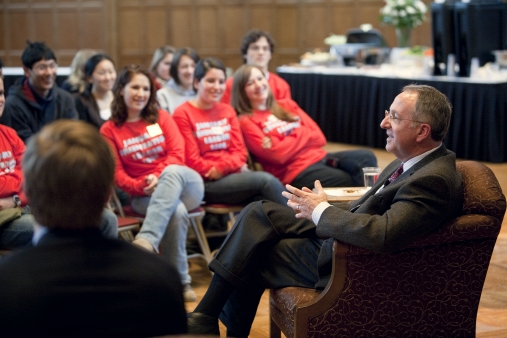FRONT OF THE BOOK
The recession, Cornell and higher education
The next two or more years will be difficult for the nation's most selective and research-intensive universities. Endowment values have plummeted, investment earnings are shrinking and philanthropy is tepid, while state and federal funds are flat at best. The ability of students and families to absorb further tuition increases is constrained, increasing pressure on financial aid budgets.

President David Skorton answers questions from students during a fireside chat in Willard Straight Hall in 2008.
So what? Aren't Cornell and its peer institutions just like other sectors of the U.S. economy? Shouldn't higher education be held to the most stringent standards of financial management and accountability as it negotiates the winds of the perfect storm that we face? No and yes.
The nation will depend on colleges and universities to help the country climb out of the hole we're in. First, like other universities we must rise to the challenge of educating more students as they pursue further education in a difficult job market; second, we must contribute crisply to policy discussions that the new presidential administration will foster on topics from energy to health care; and third, we must enhance our activities in faculty-initiated research that will lead to solutions to our problems in energy, biomedical sciences, agriculture and social issues. Innovation from basic research will be a critical component in long-term economic recovery for the nation.
In a time of financial pressure, leadership, management and governance must be guided by clear principles:
Higher education must not be allowed to become the province only of the wealthy and privileged, and, therefore, especially in times of fiscal constraint, we must bolster our need-based financial aid budgets. Despite the pressure on our students and families, real increases in the cost of education will force some increases in tuition, but these increases must be moderated compared with those in years past. Cornell is doing its part: Although next year tuition will go up by 4 percent for students in Cornell's private colleges, and 7.2 percent for its statutory schools, the university will also use an additional $35 million from its endowment to increase financial aid.
Second, we must balance our institutions' budgets. Again, Cornell is doing its part by reducing expenditures by 5 percent across the board along with drawing $150 million from uncommitted fund balances to combat the projected 10 percent budget shortfall for the Ithaca campus. Other short-term strategies include suspending, in 2009, raises for most employees and placing a pause on construction projects.
But the desire to operate in balance must be moderated by the equally important imperative to preserve the workforce within our walls. Both faculty and non-faculty employees contribute to the missions of colleges and universities. Further, institutions of higher education are often among the largest employers in their municipal, regional and even statewide economies. Decisions we make on the degree of downsizing our employee pools must be considered in light of the effects on our neighboring communities. This concern will dictate creative use of best human resource practices, including meaningful help to those who are displaced.
Third, we must preserve the capacity of our institutions for research, innovation, technology transfer and job creation through entrepreneurship. As the cover story in this magazine proves, Cornell begins that process early by involving undergraduates in research at all levels across the university.
We must balance the proven success of faculty-initiated research, which will continue to be the best recipe for societal advancement and problem solving, with the need to coordinate our research and education with the needs of our nation.
Existing higher education-business organizations can be places where the combined power of public-private partnerships can help all boats eventually to rise. The country will live under constraints for years to come, but we will not cut our way out of this recession: we must grow our way to prosperity and security and maintain an environment where research universities will be agents of positive change.
David J. Skorton is president of Cornell University and Peter C. Meinig is chair of the Board of Trustees.